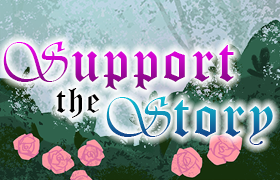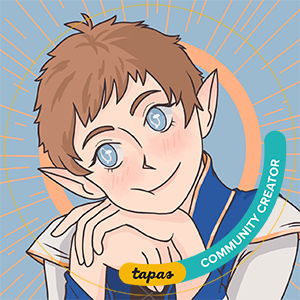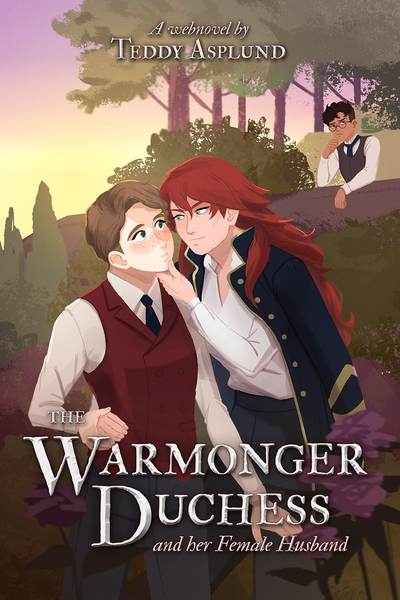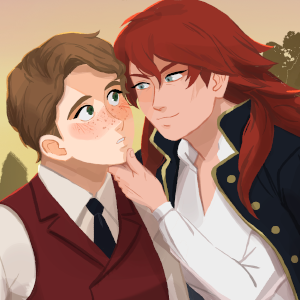The room beyond was some sort of council hall, longer than it was wide, and dimly lit, with dark-wood paneling covering every surface but the floor, which was lined with the same stone as the rest of the castle floors.
On either side of the hall stood two long wooden tables at which sat a variety of important looking men and women, loudly arguing with each other. They probably had to be loud in order to be heard by their colleagues across the hall from them.
"With all due respect, Your Grace, I don't understand why we haven't marched already."
"The cost of an expedition through the mountains, not to mention the risk of casualties—"
"What risk? Gwedric has no damn army. Their manor house is protected by a handful of lads not yet old enough to marry and old retired soldiers long past their prime. And, the law is on our side."
"But the mountains—"
The council tables stood on just slightly raised platforms; possibly with the intent to make whoever was unfortunate enough to stand in the large open space in the middle of the hall feel as intimidated as possible.
Despite this, Tamsin somehow managed to take a few steps into the room and clear her throat. "Excuse me," she said. Her voice was quieter than she intended, and her voice broke slightly in the middle of the word, but nevertheless the room fell silent at the sound.
A heavy silence hung in the air for a moment. Then a voice, the same voice who had been calling for a quick march on Gwedric, said "Who the hell are you?"
Tamsin squinted up at the man. Her eyes still hadn't adjusted to the dimness of the council chamber, so she couldn't make anyone out very clearly, but she could see his receding hairline.
Tamsin cleared her throat again and tried to speak with more confidence.
"I am Lady Tamsin Gwedric, only daughter of Earl Erhard Gwedric, and last remaining child of the Gwedric line."
A murmur went out through the crowd so that Tamsin had to raise her voice further as she continued to speak.
"But!" she said, with a small bow, lowering her eyes, and placing her right fist on her chest, over her heart. A formal, masculine form of greeting. Tamsin had been practicing it. "I appear before you today, not as Lady Tamsin, but as Viscount Roger Gwedric, heir apparent of Earl Erhard Gwedric, and betrothed of Duchess Alesia Jordaine. As the original Roger is no longer of this world, I have come in his stead to take his place and fulfill the engagement contract. Let it be known that House Gwedric fully intends to uphold its end of the agreement with House Jordaine."
Now people were shouting again.
"Fulfill the—Why, that's absurd!"
"—disrespectful—"
"Of all the ridiculous things—"
"No... I... let me explain." Tamsin tried to interject, but her voice wavered and she couldn't make herself be heard above the din. "I have a copy of the contract, and, um..." Tamsin fumbled with the objects she was carrying in her arms. "And this book, I just—"
"She could be useful as a hostage, maybe, but—"
They were entirely arguing amongst themselves now, as if Tamsin wasn't even there.
Then a voice rang out from the far end of the hall.
"Silence!"
Immediately, there was silence.
Tamsin's eyes had adjusted enough to the gloom now that she could actually see Duchess Jordaine sitting on her throne across the hall.
Tamsin had had some notion that she must be over there, of course, but she hadn't been able to actually see her. And it was easy to figure out why she had blended so easily into the shadows. She was sitting on a dark-wood throne inlaid with some sort of pitch-black gem stone, and she herself wore a close-fitting black doublet partially covered by a short black cape over one shoulder. The only thing that really stood out from afar was her shocking red hair, which danced like fire down her back.
The Duchess's sword was propped up against the seat of the throne, the hilt within arms reach.
Tamsin felt a sharp pain in her stomach.
Without a word, the Duchess gestured for Tamsin to come forward.
As Tamsin approached the throne, she was able to make out more details. The Duchess's doublet was decorated with embroidery all over, but the embroidery thread was the same black color as the fabric. Tamsin couldn't help but wonder how much work that had taken for some poor woman, sewing black on black in what must have felt like an infinite and pointless task.
Well, maybe not pointless. The effect was subtle, but Tamsin couldn't deny that it was striking.
The Duchess raised a hand to stop Tamsin's approach when she was a few feet away.
Tamsin could see her eyes from this distance. They were a calm, steady gray.
Human eyes.
"Speak your piece from here," said the Duchess. She didn't shout, but her voice carried clearly. "That way I can hear you better. As for the rest of this lot—" The Duchess nodded her head towards her councilors. "They can learn to listen more closely."
Tamsin cleared her throat and spoke, hesitantly. "If a nobleman dies before the fulfillment of an engagement contract, a close relative may take their place in the marriage. The substitute must only be an appropriate age, unmarried, and at least a second-cousin by blood."
"Surely the substitute must also be an appropriate sex, my lady," said a voice from the gallery.
"Wrong!" shouted Tamsin, spinning around to face the man. Every single person she mentioned her plan to said the exact same thing, and she was so sick of hearing it that she forgot her nervousness entirely. "There is nothing specific in imperial law or in the wording of the contract between House Gwedric and House Jordaine that requires a substitute to be of any specific sex! In fact," Tamsin held up her book so everyone could see it. "In this book, Until Death Do Us Part: True stories of love and marriage in..."
"What is this, some sort of novel?" The man laughed derisively. "Young women these days are always filling their minds with unrealistic romantic fantasies from novels. I can hardly get my daughter to put down her books to come to dinner."
A few of his colleagues laughed with him, and that really made Tamsin angry.
"True stories of love and marriage in the Viland Empire," Tamsin finished, putting particular emphasis on the first word. "It's a book written in a novelistic style in order to appeal to young ladies, that is true. But however dressed-up it is, this is a book of true history—and it cites its sources clearly. I would be happy to lend the book to you later if you would like to double-check its veracity. Or perhaps your daughter would like to read it? It seems as though you may not have the breadth of historical understanding required to enjoy such a book."
The Duchess's lips twitched into a smile, and that further fueled Tamsin's confidence.
"This book contains an account of Emperor Deorwine I and Empress Heilwig," continued Tamsin. "They were such a famously faithful and loving couple that many of our current wedding traditions can be traced back to their wedding. Many people know that much. Fewer people know that Empress Heilwig was not the original Heilwig who was betrothed to Emperor Deorwine in a treaty with what was then known as the Gerid Kingdom. That Hielwig was tragically taken by a disease that ran through the Gerid Kingdom that year, taking many lives. The Hielwig who actually married Emperor Deorwine was, in fact, her male cousin."
There was another outburst from the gallery, silenced by a glare from the Duchess.
"Can this be proven?" asked the Duchess. Her expression gave away nothing but mild interest.
"I haven't been able to double-check the sources myself, your grace," said Tamsin. "But the book cites Empress Hielwig's, the substitute's, own diary. This was in the early years of the Empire, when it was popular to keep eunuchs as servants. Eunuchs were generally literate and tasked with keeping records for their noble lords, and Hielwig had already been employed as a eunuch in the imperial palace for several years and was close with the Emperor before the cousin died. If no substitute could be found, then a war would have broken out, and Hielwig was the best option available. After the wedding, Hielwig lived out the rest of her life as a woman and erased all references to her original name. Even in her own diaries, her original name has been crossed out to the point it's unrecognizable, but she doesn't hide the fact that she wasn't born a woman. This establishes a clear precedent, your grace. It's been done before."
But the obnoxious man interjected again. "Oh, come on! That was in the time of myths. And he was a eunuch, was he? You can hardly call a man with his member chopped off a man."
"Eunuchs were still legally considered male!" countered Tamsin. "Except in this instance, when, for the sake of marriage, this eunuch was considered female. A substitute in a marriage contract takes on the legal identity of the original betrothed person for the sake of the marriage, so legally the eunuch was Hielwig, whatever body parts she did or did not have."
"Well, there's still no way to surgically add a—"
"It doesn't matter!" shouted Tamsin.
"But common sense—"
"Is irrelevant! I don't care about common sense or what you think you see in front of you. What matters is what's on paper. What matters is the law."
There was a general murmuring.
The Duchess stood up and everyone fell silent again.
"You've been quite talkative today, Baron Durrg," said the Duchess. "Tell me, then, do you remember the Catechism of Judith?"
No one spoke up.
"Come on, now," said the Duchess. "It is the opening line of the Imperial Code of Law, penned by Empress Judith herself upon the founding of the Viland Empire. We were all taught it by our tutors. Can no one recite the Catechism?"
Someone Tamsin hadn't noticed before, back near the doorway, stood up. He was an older man with a bald head and dark skin, and when he spoke his voice was deep and confident. "'The law is the word, and the word is the law,' your grace."
Duchess Jordaine smiled again. "Thank you, Viscount Wescotte," she said. "As you all have been so eager to remind me today, imperial law is absolute and unyielding. The word of the law is irrefutable. If you all say I must invade Gwedric according to the law, then perhaps it is true that, according to the law, I must marry this woman who claims by law to be a man. If that is what the law declares, who are you all to question it? If the law must be obeyed in one instance, then why must it be tossed aside in another? Tell me!"
This final, shouted command resonated through the silent hall. The various ministers and officials fidgeted in their seats and glanced at each other nervously, but no one dared speak up. Only Viscount Wescotte, the man who had recited the catechism, continued to sit tall and resolutely watch the proceedings.
"We will discuss this further. I'm sure you'll all have much to say, once you find your voices again. But first," the Duchess turned to Tamsin and lowered her voice. "I'm sure Hugo is waiting outside for you. He can show you and any companions you brought to some chambers where you can rest. And tell Hugo to have the Book of Law sent to the council. I suspect this discussion will go on for some time."
"I'm not tired, I can—"
"Go," said the Duchess, in a tone that made it clear she was not to be argued with.
Tamsin obediently left the council chamber, and it was only as she was blinking against the sudden brightness of the hallway that she realized how worn out she truly was. It had only been determination and nervous energy that had kept her going, and now it was like her body and mind were rebelling against the rough treatment.
Tamsin passed on the Duchess's instructions in a daze, ignoring Frieg's worried eyes clearly pleading for an explanation of what happened. When Hugo showed her to a bedchamber she said goodbye to Frieg and immediately collapsed onto the bed.
I've done all I can do, Tamsin thought, as she felt herself slipping from consciousness. It's up to the Duchess now.
She tried to put the memories of swords and death from her mind. Instead, she remembered Frieg's words:
Whatever she is, she's not a monster. She's just a person.













Comments (3)
See all